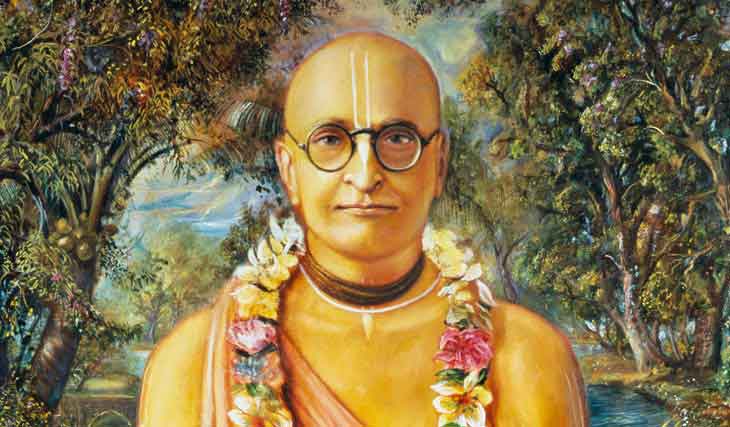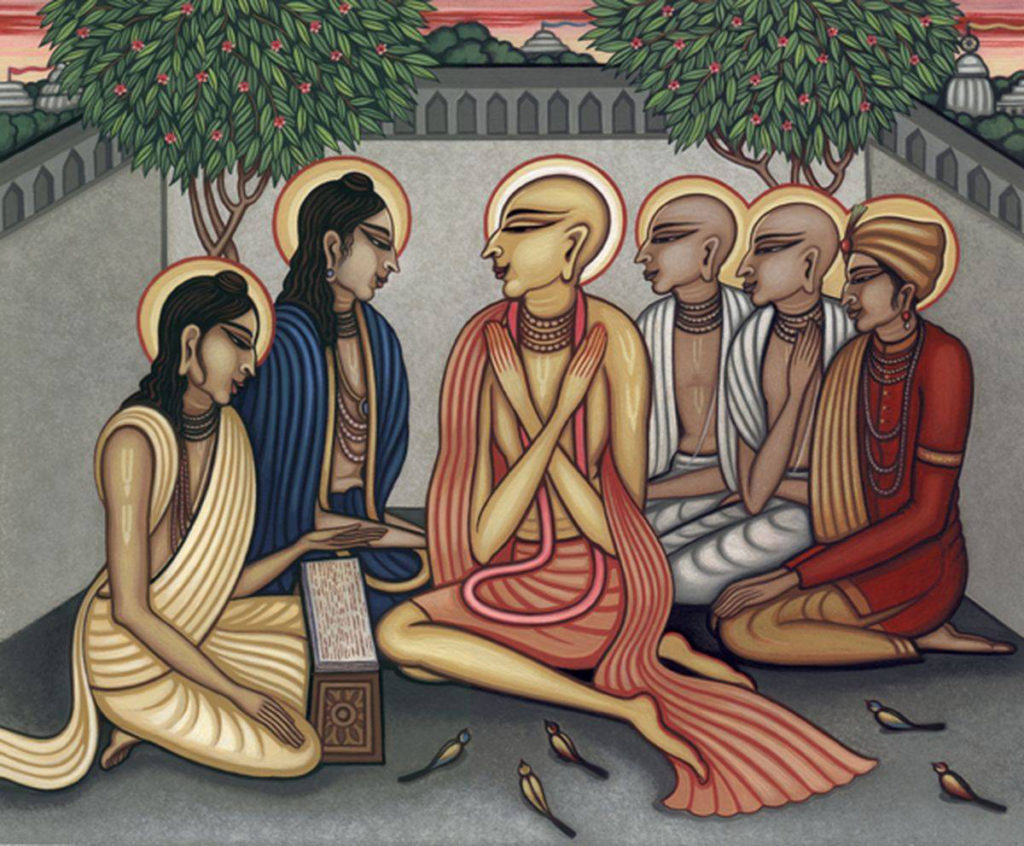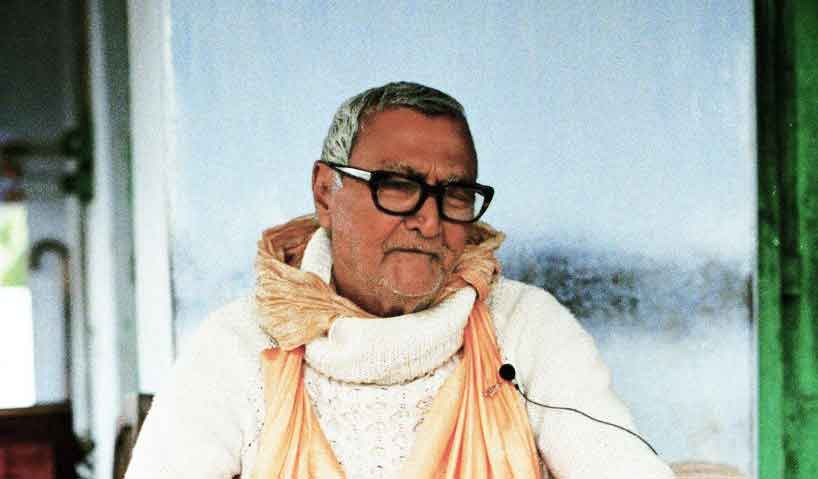Overview
In this transcript which first appeared in Bengali in the 9th Volume of The Gauḍīya, published on 18th April 1931, Śrīla Sarasvatī Ṭhākura explains the duty of a Vaiṣṇava householder in relation to hari-bhajana. This article was translated into English by Swami B.V. Giri and Sanātana Dāsa.
On the morning of Friday, April 10, 1931, parama-bhāgavata Śrīyukta Nitya-Gopāla Ghoṣa Mahāśaya, one of the most important helpers of the preachers of Śrī Gauḍīya Matha, who has great faith in the Vaiṣṇavas and who is dedicated to the Holy Name of the Lord, having finished constructing his new home, sanctified it with the foot dust of His Divine Grace Oṁ Viṣṇupāda Śrīmad Bhaktisiddhānta Sarasvatī Gosvāmī Prabhupāda, only entering it after the guru and his pure Vaiṣṇava servants. Those who perform gṛha-praveśa, following the rituals of the materialistic karma-kāṇḍa Smārta paddhatis, certainly fall down again and again into the dark well of materialistic household life; but that householder who reject such common conceptions and is always entertaining spiritual topics, maintaining a mood of humility and submission, always inviting the paramahaṁsa mahā-bhāgavata and the pure devotees to his home and filling his new home with hari-bhajana benefits his town and indeed the whole world.
For this purpose, filled with causeless mercy, the saviour of the fallen Śrī Śrīla Prabhupāda and his associates stepped into the home of Śrīyukta Nitya-Gopāla Ghoṣa Mahāśaya and spoke hari-kathā and performed kīrtana with the understanding that entering a spiritually surcharged house and entering the maṭha are non-different. In this place Śrīla Prabhupāda manifested some ambrosial instructions. That morning, Śrīmad Ananta Vāsudeva Parāvidyābhūṣaṇa B.A, Śrīyukta Haripāda Vidyāratna MA. BL. and Paṇḍita Śrīyukta Pramoda-bhūṣaṇa Cakravartī Pratna-vidyālaṅkara Mahāśaya performed saṅkīrtana for the satisfaction of Gaurāṅga. At the request of Śrī Śrīla Prabhupāda, the Gauḍīya editor Śrīpāda Sundarānanda Vidyāvinoda Prabhu read and explained the precepts of the duties of gṛhastha-āśrama from the Śrīmad Bhāgavatam, 4th Canto, 22nd Chapter, wherein Mahaṛṣi Sanat-kumāra’s gives instructions to Mahārāja Pṛthu.
That same day in the evening, Śrī Śrīla Prabhupāda and his associates came to the home of parama-bhāgavata Śrīyukta Nitya-Gopāla Ghoṣa Mahāśaya and delivered instructions concerning the gṛha-praveśa performed by the spiritually minded householder. At that time we had the chance to hear that and we consider ourselves to be most fortunate. We have published some of that here).
*************************************************************
By the powerful association of the representatives of a paramahaṁsa, one removes the risk of falling into the dark well of family life and the same powerful association with liberated family members allows one to become a paramārthika-gṛhastha. When one does not constantly deliberate upon Śrīmad bhakta-bhāgavata and Śrīmad grantha-bhāgavata, then there can be no auspiciousness in that house. Those who do not live every moment by the mercy of the Bhāgavata, will not be able to understand the meaning of the two instructions of Śrī Gaurasundara – these two commandments serve as a guiding light towards the ultimate goal of life:
anāsaktasya viṣayān yathārham upayuñjataḥ
nirbandhaḥ kṛṣṇa-sambandhe yuktaṁ vairāgyam ucyate
prāpañcikatayā buddhyā hari-sambandhi-vastunaḥ
mumukṣubhiḥ parityāgo vairāgyaṁ phalgu kathyate
“Things should be accepted for the Lord’s service and not for one’s personal sense gratification. If one accepts something without attachment and accepts it because it is related to Kṛṣṇa, one’s renunciation is called yukta-vairāgya. When persons eager to achieve liberation renounce things that are related to the Supreme, though they are material, this is called incomplete renunciation.” (Bhakti-rasāmṛta-sindhu 2.253-542)
Gṛha-praveśa is the duty of every Vaiṣṇava, because the house will become conducive for hari-bhajana. It is not possible for those that follow gṛha-vrata-dharma. It is better to enter the house and make the vow that, “I shall serve Kṛṣṇa.” It is incomparably better than those that follow futile monkey-like renunciation (markaṭa-vairāgya). Firstly, one who follows such useless renunciation is not a good sādhaka. If family life is favourable to hari-bhajana, then one should accept the gṛhastha-āśrama, and if family life is unfavourable then one should certainly reject the dark well of household life. If one shows aversion to family life simply to demonstrate the gymnastic feats of useless renunciates, then the rejection of household life will never be beneficial. It will only be a matter of a couple of days before such immature vairāgīs will fall down.
There is no difference between entering a spiritual household and entering a maṭha; but do not mix the gṛha-praveśa of the gṛha-vrata and the gṛha-praveśa of the kṛṣṇa-vrata together just as you would mix muri. Those that belong to the school of the gṛha-vrata cannot understand these words. For those whose life is governed by the Śrīmad Bhāgavatam, their attachment to gṛha-vrata-dharma is completely destroyed. Those who enter household life following the laws of the external world will be increasingly absorbed in gṛha-vrta-dharma. Just as the acceptance of the sannyāsa-āśrama is most essential for the Lord’s devotees, similarly entering the gṛhastha-āśrama and gṛha-praveśa are also essential for the Lord’s devotees.
Gṛha-praveśa should only be performed by the Lord’s devotees, the non-devotees should not perform it. When the Lord’s devotee performs the gṛha-praveśa, we should understand that he has actually entered his maṭha. Performing gṛha-praveśa is for creating a conducive environment to constantly serve Kṛṣṇa. Collecting more than necessary (atyāhāra), over endeavouring (praya), gossiping (prajalpa), neglecting the scriptural injunctions (niyamāgraha), bad association (jana–saṅga) and mental restlessness (laulyam) – a spiritually minded householder should always keep these things far away. With enthusiasm (utsāhā), determination (niścaya), patience (dhairya) he should constantly cultivate such various divisions of bhakti such as hearing and chanting etc; he should completely reject female association which is not according to scriptural law, association with those who are attached to women and those who are dominated by a feminine nature and he should abandon the bad association of non-devotees of Kṛṣṇa. He should perform his activities by following the virtuous examples of Pṛthu, Ambarīṣa and other mahājanas, all his ordinary and spiritual activities should be done while cultivating a favourable mood of hari-sevā. The spiritually minded householder should curb the impulses of speech, mind, anger, tongue, stomach and genitals. That man who is who is totally indifferent to all the instructions given in Śrī Upadeśāmṛta and is obsessed with household affairs almost has the nature of an animal. He deviates from gṛhastha-dharma and becomes firmly attached to gṛha-vrata-dharma. “I will not accept gṛha-vrata-dharma nor useless renunciation and for the sake of hari-bhajana I will perform the spiritual activities of gṛhastha-dharma and act as a caretaker for Kṛṣṇa by earning money honestly to perform kṛṣṇa-bhajana” – in this way one who is spiritually minded will make this vow when entering the house. Immorality makes hari-bhajana impossible, only when one is moral can hari-bhajana be performed.
It is not possible to serve Hari while collecting a multitude of sins, and it is also not possible to serve Hari by performing various works of piety. For those people who think about the limited boundaries of their piety, who wish to enjoy the fruits of their own heroic works and who desire to nourish their crooked mentality, there is no other way for them to be freed of their misconceptions except by the exclusive worship of Śrī Hari through the execution of gṛhastha-dharma. By the endeavours of trying to satisfy his senses, the sensual gṛha-vrati will fall down; but by completely endeavouring to serve Kṛṣṇa, he acquires auspiciousness. By niyamāgraha (infatuation with ritualistic ceremonies) and niyama-agraha (disregard for the scriptural injunctions), one becomes a gṛha-vrata. Many people think, “I will enter my new house, shut the doors and chant japa! That will be auspicious and I will also be recognized as a spiritually-minded householder.” But after many days chanting on beads they will fall into the dark well of the basest pleasures. If they did not perform kīrtana after hearing the words delivered from the divine mouth of the associates of the paramahaṁsas, if they do not construct their lives properly, they will descend into gṛha-vrata-dharma. gṛhastha devotees will try to do everything possible to help those who have given up everything and who constantly perform kṛṣṇa-bhajana.
The present business of Śrī Gauḍīya Maṭha is to engage all of mankind in the service of Śrī Hari – to this end Śrī Gauḍīya Maṭha is willing to spend many, many gallons of blood. Those who are reluctant to take up this opportunity of service and are immersed in gṛha-vrata-dharma, are aware of this. The spiritually-minded householder works hard for his wife and children, and works just as hard to serve Hari. Knowing that his wife and children belong to Bhagavān, he feeds them and takes care of them. Otherwise, just as one does not feed a snake bananas and milk, if the association of family members is unfavourable then one should remain aloof from them. Such spiritually-minded householders have absolutely no interest in material pleasures, he only tries to serve Hari twenty-four hours a day. He is kṛṣṇārthe akhila-ceṣṭā (‘Serving Kṛṣṇa at all times’) at all times and in various ways he is busy serving Hari. gṛhastha devotees fully respect the spiritual concepts of duty and morality, but as regards mundane ethics, they have neither love nor hatred towards them. For one whose consciousness is always immersed in divine service, all his mundane obligations are concluded by his performance of spiritual duties.
Tirumaṅgai Āḷvār took birth in the Kallara tribe. Even though he preached hari-bhakti, influenced by his past saṁskāras, he was involved in robbery. Yet his heart was moved by spiritual ethics, and he even managed to make robbery favourable to serve Lord Hari. Only the devotees of Bhagavān know the art of utilising any activity in the service of Hari. When Jagad-bandhu Bhakti-rañjana Mahāśaya could have done many things with his wealth, he made his accumulated money favourable by engaging it in the service of Hari. He mastered the spirit of service in such a short time! Amongst unlimited multitudes of jīvas, one can scarcely comprehend how one came to the Lord so suddenly. He surrendered everything to the service of Hari.
He decided that, “This family and home is His, and if I perform service to Hari, whatever will be left will be His prasādam and I shall accept His remnants.” He had only to realise that his losses and gains were all connected to the service of Hari; he was not involved in either sin or piety. By trying to deceive the Supreme Lord by one’s sin or piety, exploitation or renunciation, morality or immorality, one will be forced to reap the fruits of good and evil. But if all results go to the Almighty, the jīva will not be involved in the consequences of good and evil. A man robs others to enjoy for himself, but Tirumaṅgai Āḷvār robbed others for the service of Viṣṇu, and thus he did not have to pay for the results of his plundering. All the ways by which Jagad-bandhu Bābu had to resort to in order to earn his fortune and all the difficulties he encountered found their true meaning when he offered the fruits of both morality and immorality in the service of the Supreme Controller.
But relying upon the Holy Name is no reason to sin. “Since Tirumaṅgai Āḷvār served Hari by robbing people, then let all looting be used to serve Hari” – such arguments come from the desire to commit sinful activities on the strength of chanting the Holy Name. Jagad-bandhu Bābu’s material activities were unexpectedly used to serve Hari. The idea that, “First we should become good materialists and then we will become servants of Hari” – this sort of argument is unfavourable in cultivating devotion. Even if the divine will utilizes activities that are due to one’s previous saṁskāra, in the service of Hari, such acts cannot be considered as the rule or as an example for ordinary people. Although Tirumaṅgai Āḷvār was committing crimes, although Jagad-bandhu was facilitating service by inappropriate ways sometimes, through the results of their extraordinary sukṛti, the considered everything as the property of the Supreme Lord, and being utilized in that way, it became beneficial.
Engaging in karma is futile. The path of karma-kāṇḍa never brings the jīva any auspiciousness – they are just like a football. One minute the jīva is up, the next minute they are down again and they are constantly moving around. By receiving a good thrashing for his sins, the jīva gradually takes to the path of piety, then once again when he has been deceived by the illusory flowers of piety, he again turns to the path of sinful activities. Due to this he takes to the path of renunciation – the desire to renounce everything up to the point of moksa. These are known as the specific activities of devotion to the Lord.
Whether a devotee resides in the house or he resides in the maṭha – the result is the same. A devotee is always vigilant; every act he performs is for worship of the Almighty, and not for the worship of Satan or an attempt to enjoy for himself.
******************************************
GLOSSARY
gṛha-praveśa – The ceremony of entering a newly constructed house for the first time
gṛha-vrata-dharma – Following materialistic household life
Jagad-bandhu Bhakti-rañjana – The spiritual name of Śrī J.B. Dutta, a wealthy businessman of Calcutta and disciple of Śrīla Sarasvatī Ṭhākura
Muri – Dried puffed rice mixed with spices
Paddhati – A text describing the performance of various rituals
Saṁskāra – The results of one’s previous actions
Tirumaṅgai Āḷvār – One of the twelve Āḷvār saints of the Śrī Vaiṣṇava sampradāya
Related Articles & Books
Further Reading
- A Vaiṣṇava Householder’s Hospitality to Guests by Śrīla Bhaktivinoda Ṭhākura
- The Livelihood of Householder Vaiṣṇavas by Śrīla Bhaktivinoda Ṭhākura
- The Brāhmaṇa and the Vaiṣṇava – Both are Completely Vedic by Śrīla Bhaktivinoda Ṭhākura
- The Savings of a Vaiṣṇava by Śrīla Bhaktivinoda Ṭhākura
- Begging Alms by Śrīla Bhaktivinoda Ṭhākura
- Brāhmaṇism and Vaiṣṇavism by Śrīla Bhaktivinoda Ṭhākura
- The Marriage System of Bengal by Śrīla Bhaktivinoda Ṭhākura
Prema Dhāma Deva Stotram with the Narasiṅgha Sevaka Commentary – Verses 61-65
In verses 61 to 65 of 'Prema Dhāma Deva Stotram', Śrīla Śrīdhara Mahārāja narrates the pastime of Śrī Caitanya at Caṭaka Parvata In Purī and explains how the scriptures produced by Brahmā and Śiva are ultimately searching for the personality of Mahāprabhu who is merciful too all jīvas, no matter what their social position.
Prabhupāda Śrīla Sarasvatī Ṭhākura’s Visit to Ayodhyā
With the forthcoming observance of Śrī Rāma Navamī, we present 'Prabhupāda Śrīla Sarasvatī Ṭhākura’s Visit to Ayodhyā' written by Śrīla Bhaktisiddhānta Sarasvatī Ṭhākura Prabhupāda from The Gaudīyā magazine, Vol 3. Issue 21/ In December 1924, after visiting Benares and Prāyāga, Sarasvatī Ṭhākura visited the birth-site of Śrī Rāmācandra in Ayodhyā.
Śaraṇāgati – The Only Path to Auspiciousness
In this article, 'Śaraṇāgati - The Only Path to Auspiciousness', Dhīra Lalitā Dāsī analyses the process of śaraṇāgati (surrender) beginning with śraddhā (faith). She also discusses the role of śāstra and the Vaiṣṇava in connection with surrender.
Ātma Samīkṣā – The Value of Introspection
In this article, "Ātma Samīkṣā – The Value of Introspection" Kalki Dāsa highlights the importance of introspection in the life of a devotee and especially in relation to the worldly environment that surrounds us. He also explains how transcendental sound influences our capacity to introspect.
Prema Dhāma Deva Stotram with the Narasiṅgha Sevaka Commentary – Verses 61-65
In verses 61 to 65 of 'Prema Dhāma Deva Stotram', Śrīla Śrīdhara Mahārāja narrates the pastime of Śrī Caitanya at Caṭaka Parvata In Purī and explains how the scriptures produced by Brahmā and Śiva are ultimately searching for the personality of Mahāprabhu who is merciful too all jīvas, no matter what their social position.
Prabhupāda Śrīla Sarasvatī Ṭhākura’s Visit to Ayodhyā
With the forthcoming observance of Śrī Rāma Navamī, we present 'Prabhupāda Śrīla Sarasvatī Ṭhākura’s Visit to Ayodhyā' written by Śrīla Bhaktisiddhānta Sarasvatī Ṭhākura Prabhupāda from The Gaudīyā magazine, Vol 3. Issue 21/ In December 1924, after visiting Benares and Prāyāga, Sarasvatī Ṭhākura visited the birth-site of Śrī Rāmācandra in Ayodhyā.
Śaraṇāgati – The Only Path to Auspiciousness
In this article, 'Śaraṇāgati - The Only Path to Auspiciousness', Dhīra Lalitā Dāsī analyses the process of śaraṇāgati (surrender) beginning with śraddhā (faith). She also discusses the role of śāstra and the Vaiṣṇava in connection with surrender.
Ātma Samīkṣā – The Value of Introspection
In this article, "Ātma Samīkṣā – The Value of Introspection" Kalki Dāsa highlights the importance of introspection in the life of a devotee and especially in relation to the worldly environment that surrounds us. He also explains how transcendental sound influences our capacity to introspect.








